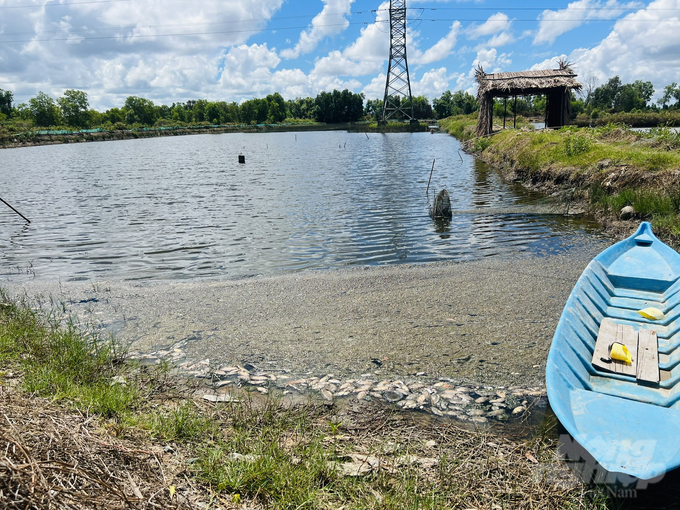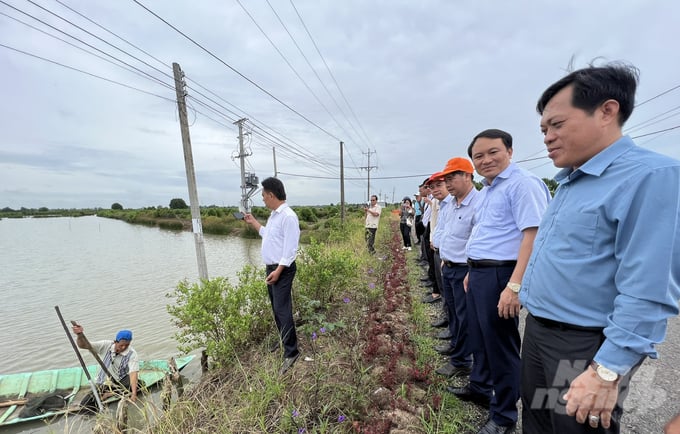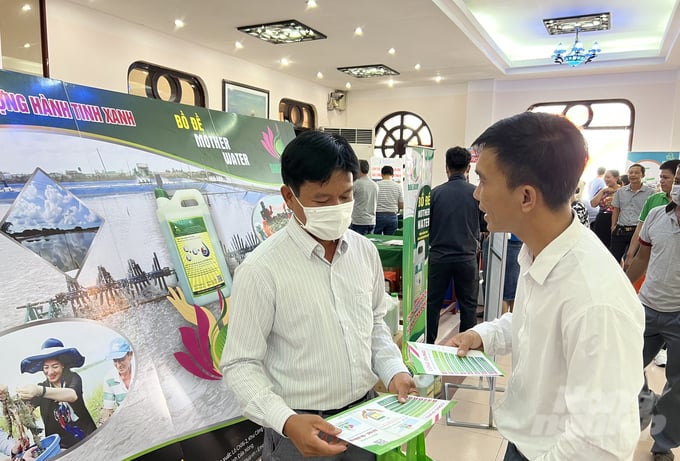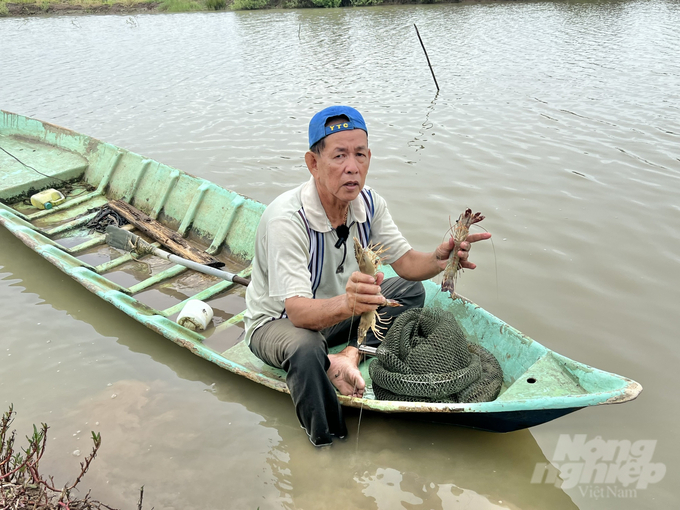May 30, 2025 | 15:04 GMT +7
May 30, 2025 | 15:04 GMT +7
Hotline: 0913.378.918
May 30, 2025 | 15:04 GMT +7
Hotline: 0913.378.918

Water sources are increasingly polluted due to the impacts of climate change. Photo: Trong Linh.
Tran Minh Dau (Thuan Dien hamlet, Long Dien Tay commune, Dong Hai district) excitedly said: The family has 2 hectares of farming under the extensive farming model combining shrimp - crab - fish. After participating in the project and instructing the use of biotech products and products, I found unexpected effects. The product helps to improve the water environment. The shrimp looks very beautiful, especially for high productivity.
Around 2000, converting from rice to shrimp farming according to the traditional extensive model in the early years was quite adequate, and people also had a stable life. However, in recent years, under the impact of climate change, the model gradually became ineffective, farmers lost their crops continuously, and their livelihoods began to be turned upside down.

Nguyen Trung Hieu (blue shirt), Deputy Director of the Department of Agriculture and Rural Development of Bac Lieu province, inspects the shrimp farming model in Long Dien Tay commune, Dong Hai district. Photo: Trong Linh.
Nguyen Trung Hieu, Deputy Director of Bac Lieu Department of Agriculture and Rural Development, assessed: The project has contributed to raising awareness and understanding about the impacts of climate change, drought, and saltwater intrusion on production and people's livelihood. Apply science and technology to reduce risks to the community's livelihoods, contribute to stabilizing and protecting the environment, sustainable use of natural resources, economic development, and poverty reduction in the locality.
In particular, changing shrimp farming practices that depend on "chance" to actively use biotechnology to manage the pond environment in the production process. In addition, using high-quality shrimp fingerling limits the risk of diseases and increases productivity. Using disease-free shrimp seed, using probiotics and minerals to manage the water environment during farming, and rearing shrimp before being put into farming and changing old farming practices that used a lot of inorganic fertilizers and chemical drugs to green production, using microorganisms in combination with biotechnology products and afforestation.
As one of the pioneering enterprises in the application of biotechnology to shrimp farming, Nguyen Thi Hang, General Director of Bo De Fishery Group Joint Stock Company, said: Over the past time, the unit has implemented the project: "Professionalization of farmers" in the provinces of Ben Tre, Tra Vinh, Soc Trang, Bac Lieu, Kien Giang, Long An... Applying Bo De biotechnology products to shrimp farming and treatment extensive shrimp farming environment, improved extensive farming, shrimp - rice, wild shrimp...
The application of biotechnology in shrimp farming and aquaculture is considered a solution to solve the problem of environmental pollution in ponds, minimizing the situation of infected animals, increasing production, and increasing the yield.

Application of microorganisms to replace antibiotics in aquaculture. Photo: Trong Linh.
In recent years, the situation of climate change has become more and more severe each year and without any rule, significantly affecting the lives and production of people in the Mekong Delta, in which agricultural production is one of the most critical factors in the development of the Mekong Delta region. among the most affected.
The shrimp-forest model helps farming households be profitable, with an average profit of about VND 70-80 million/ha per year. The shrimp farming model under the mangrove canopy ensures income for people and sustainable development and goes hand in hand with protecting the ecological environment. It is necessary to have an appropriate solution to create income for farmers associated with environmental protection.
According to Luu Hoang Ly, Director of the Department of Agriculture and Rural Development of Bac Lieu province, the advantages of the shrimp-forest model compared with other models are low investment capital, no fear of polluted water, and no fear of prolonged heat but still quite profitable. Those are the benefits of shrimp farming under the forest canopy. Shrimp farming under the mangroves is implemented through improved extensive agriculture, natural water sources, utilizing raw materials in the forest, and stocking shrimp at low density without antibiotics.

Farmer Tran Van Bay by the shrimp pond has just been harvested. Photo: Trong Linh.
The shrimp-forest model helps people become more aware of afforestation combined with shrimp farming to generate income and protect ecology. Thereby improving economic efficiency and sustaining and developing the ecological environment of mangrove forests. Shrimp farming and planting and protecting forests are highly effective and sustainable. This model has influenced people's thinking and stimulated people to invest in replanting the lost forest area.
In recent years, Bac Lieu province has implemented many projects and formed many production models suitable for climate change, bringing economic value and sustainable development with many diverse shrimp farming models such as the super-intensive shrimp farming model, the shrimp-rice model, and the forest shrimp model along the value chain have brought many benefits...
For example, the project of ecological shrimp farming (shrimp - forest) along the value chain to adapt to climate change by the Department of International Cooperation (MARD) has just ended, bringing economic development for many households.
In Bac Lieu, the project has a scale of 100 ha, with 100 households being members of Thuan Dien Cooperative, Thuan Dien hamlet, Long Dien Tay commune, Dong Hai district, Bac Lieu province. The project used biotechnology and probiotic products.
Translated by Tu Quyen

(VAN) Mr. Nguyen Thanh Cong, Vice Chairman of the Son La Provincial People's Committee, reflects on Son La’s journey from barren hills to fruitful orchards after a decade of hard work.

(VAN) FAO’s Director-General addresses the 5th Baghdad International Water Conference.
/2025/05/26/1716-4-nongnghiep-191706.jpg)
(VAN) Chain linkages, technological innovation, and raw material zoning are three strategic pillars for the coconut industry to strongly develop and elevate its position on the global agricultural map.
![Advanced mariculture – an inevitable trend: [4] Accompanied by scientists](https://t.ex-cdn.com/nongnghiepmoitruong.vn/608w/files/sohk/2025/05/13/1941-pgsts-vo-van-nha-140958_717.jpg)
(VAN) According to Assoc. Prof. Dr. Vo Van Nha, Director of the RIA III, the development of advanced offshore mariculture is no longer an option but an essential path for Vietnam’s fisheries sector.

(VAN) Vietnam is intensifying the development of mollusk farming areas that meet international standards, aiming for sustainable growth and enhancing its export position in the global seafood market.
![Advanced mariculture – an inevitable trend: [3] Policy-driven momentum](https://t.ex-cdn.com/nongnghiepmoitruong.vn/608w/files/doanhtq/2025/05/21/0104-0616-0348-nuoi-bien-170339_789.jpg)
(VAN) To ensure the success of offshore mariculture that uses advanced technologies, it is essential to establish supportive policies that inspire both individuals and enterprises to invest with confidence.
![Advanced mariculture – an inevitable trend: [2] Outstanding results](https://t.ex-cdn.com/nongnghiepmoitruong.vn/608w/files/sohk/2025/05/12/4632-4136-nuoi-bien-11-164117_819.jpg)
(VAN) Pilot models of high-tech offshore mariculture in Vietnam, particularly in the South Central Coast region, have demonstrated exceptional economic returns and sustainability, setting a new direction for the country’s aquaculture industry.